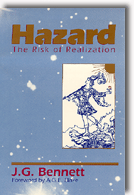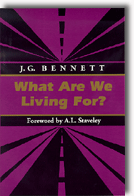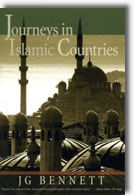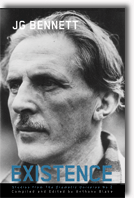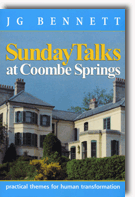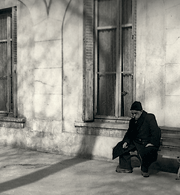Description
Trade Paperback • 128 pages
The new foreword by A.G.E. Blake locates the Gurdjieffian concept of hazard in the context of the new sciences. Hazard is an objective property of the world making human acts significant. This is book one of talks given on ideas found in The Dramatic Universe.
Review by Pierce Butler
DESCRIPTION:
Mr. Bennett uses the game of backgammon to introduce the notion of hazard, which he defines as “the combination of uncertainty with significance.” In spite of our longing for certainty and stability, we must see that the evolution of life and the structure of matter itself are dependent upon the existence of uncertainty and risk. In a world in which choice is possible, there is a potential for different qualities of experience that could not exist if all outcomes were predetermined. Even what we regard as virtue depends upon the existence of hazard: honesty is meaningless in the absence of temptation. Mr. Bennett proposes a way of life attuned to the opportunity that resides in hazard; this requires a kind of judgment or a commitment in the face of uncertainty that eschews the mechanical attitudes of the optimist and the pessimist while at the same time is neither realism nor opportunism.
The study of history furnishes many examples of the action of hazard and of Mr. Bennett’s essential contention that a time of turmoil and danger frequently creates opportunities for advancement that do not exist in times of stability. In the final chapter, he refutes the possible philosophical objections to the existence of universal hazard and describes its relevance for the fundamental issues of free will, evil, and religious belief. The book closes with a theological discussion of the concept of sin and of the relationship of God to a creation that incorporates hazard.
QUOTATIONS:
–“Hope does not consist in the realization of potential, but in the augmentation of potential. This is objective hope.”
–“The doctrine of the omnipotence of God is certainly incompatible with the reality of hazard in Creation.”
–“There is no other way in which we can come to terms with the world except to reject any kind of security, either proximate or ultimate, or any expectation of finding a truth that is ultimate and absolute.”
–“In a perfect world, there would be no place for goodness.”
–“There is no permanent, unchanging reality onto which we can fasten or toward which we can hope to move. There is only an uncertain, changing, unstable world within which we can catch glimpse of some possible meaning.”
–“To take an opportunity means an act of judgment.”
–“The [required] attitude… consists in taking… uncertainties not as obstacles to the achievement of the aim… but, on the contrary, as the only means by which the way is opened.”
–“As soon as there is some interaction between mind and mindlessness, then there is hazard because mind is meaningful and mindlessness is without meaning.”
–“To say that God is love and that he loves the world would be quite meaningless if the world were no more than a passive instrument in God’s hands, bound entirely by the Divine Will in every action, in every event, large and small.”
TABLE OF CONTENTS:
I. Beliefs: Ancient and Modern: games; longing for certainty; risk; evolution and danger; necessity of hazard.
II. The Moment of Choice: uncertainty and significance; potentiality; objectively different worlds.
III. The Uncertainty of Virtue: opportunity; hazard and virtue; goodness and temptation; relativity of truth; acceptance.
IV. Living Toward the Center: attitudes to uncertainty; judgment and commitment; aesthetic judgment; personal relationships.
V. Risk into History: types of historical hazard; Gurdjieff’s concept of solioonensius.
VI. The Universe and God: scientific and philosophic conceptions of hazard; theories of evolution; free will; the existence of evil; conceptions of God.
WHO SHOULD READ:
Hazard is the first book in the Dramatic Universe Series (which also includes Creation and Existence). These books attempt to present ideas that are developed at greater length in Mr. Bennett’s magnum opus, as well as propositions that are suggested by, but not pursued in, the larger work. Therefore the series as a whole is of interest to those who wish to sample the contents of The Dramatic Universe.
QUESTIONS:
–Why do human beings long for certainty?
–What is the relationship between hazard and opportunity?
–How can the acceptance of uncertainty change one’s life?
–What would a world without uncertainty be like?
–How can we reconcile a world in which evil and suffering exist with the notion of a loving and all-powerful God?
CONNECTIONS/RELATED WORKS:

